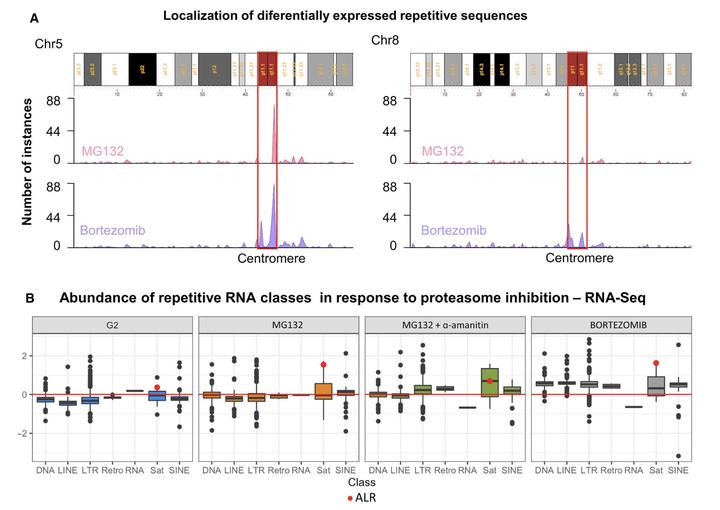Proteasome inhibition alters mitotic progression through the upregulation of centromeric α‐Satellite RNAs
 Trancriptomic analysis of repetitive elements
Trancriptomic analysis of repetitive elements
Abstract
Cell cycle progression requires control of the abundance of several proteins and RNAs over space and time to properly transit from one phase to the next and to ensure faithful genomic inheritance in daughter cells. The proteasome, the main protein degradation system of the cell, facilitates the establishment of a proteome specific to each phase of the cell cycle. Its activity also strongly influences transcription. Here, we detected the upregulation of repetitive RNAs upon proteasome inhibition in human cancer cells using RNA-seq. The effect of proteasome inhibition on centromeres was remarkable, especially on α-Satellite RNAs. We showed that α-Satellite RNAs fluctuate along the cell cycle and interact with members of the cohesin ring, suggesting that these transcripts may take part in the regulation of mitotic progression. Next, we forced exogenous overexpression and used gapmer oligonucleotide targeting to demonstrate that α-Sat RNAs have regulatory roles in mitosis. Finally, we explored the transcriptional regulation of α-Satellite DNA. Through in silico analyses, we detected the presence of CCAAT transcription factor-binding motifs within α-Satellite centromeric arrays. Using high-resolution three-dimensional immuno-FISH and ChIP-qPCR, we showed an association between the α-Satellite upregulation and the recruitment of the transcription factor NFY-A to the centromere upon MG132-induced proteasome inhibition. Together, our results show that the proteasome controls α-Satellite RNAs associated with the regulation of mitosis.